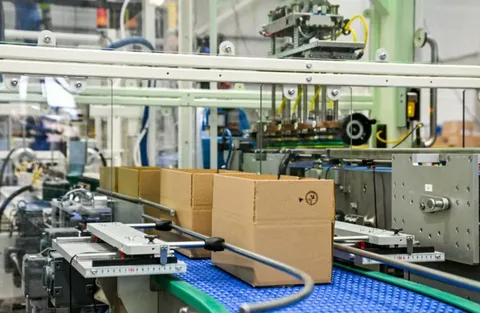In today’s fast-paced industrial and commercial sectors, businesses are constantly seeking ways to enhance efficiency, precision, and productivity. Whether it’s the press operators ensuring high-quality prints, professional sign installation services that help businesses stand out, or packaging line automation revolutionizing the way products are packed and distributed, each plays a vital role in modern operations.
This guide explores the importance of these three key elements, their impact on various industries, and how businesses can leverage them for success.
The Role of a Press Operator in Manufacturing and Printing
A press operator is a highly skilled professional responsible for operating and maintaining printing presses and other related machinery. These operators ensure that newspapers, magazines, labels, packaging materials, and other printed materials are produced with precision and efficiency.
Key Responsibilities of a Press Operator
- Operating Printing Press Machines – Ensuring machines run smoothly and efficiently to produce high-quality prints.
- Monitoring Print Quality – Checking color accuracy, alignment, and ink distribution.
- Routine Maintenance – Cleaning and maintaining printing presses to prevent malfunctions.
- Adjusting Machine Settings – Calibrating machines for different materials, colors, and production speeds.
- Ensuring Safety Compliance – Following safety protocols to prevent accidents and machine damage.
Industries That Rely on Press Operators
- Publishing – Newspapers, magazines, and books require high-quality printing.
- Packaging – Labels, boxes, and other packaging materials need consistent branding and design.
- Advertising & Marketing – Flyers, banners, posters, and brochures are produced in bulk.
- Textile & Apparel – Screen printing and fabric printing for clothing and fashion industries.
How to Become a Press Operator
- Education & Training – A high school diploma and technical training in printing technology.
- Certifications – Some positions require certifications in industrial printing.
- Experience & Skill Development – Hands-on experience with press machines and software tools.
With advancements in printing technology, press operators are now integrating digital and automated systems into traditional workflows, ensuring high-quality results with minimal errors.
Sign Installation Services: Helping Businesses Make an Impact
For businesses looking to enhance their visibility, sign installation services are essential. A well-designed and professionally installed sign can attract customers, promote brand recognition, and provide vital information to the public.
Types of Sign Installation Services
- Outdoor Signage – Billboards, storefront signs, and roadside advertisements.
- Indoor Signage – Lobby signs, wayfinding signs, and promotional banners.
- LED & Digital Signs – High-tech displays for real-time promotions and dynamic advertising.
- Vehicle Wraps & Graphics – Mobile advertising through car, truck, or fleet branding.
- Custom Signs – Tailored signage solutions for specific industries, events, and businesses.
Benefits of Professional Sign Installation Services
- Increased Brand Visibility – A strategically placed sign can significantly boost foot traffic.
- Professional Appeal – High-quality signage makes businesses appear more trustworthy and credible.
- Durability & Longevity – Proper installation ensures that signs withstand weather and environmental conditions.
- Compliance with Local Regulations – Signage professionals handle permits and legal requirements.
Industries That Need Sign Installation Services
- Retail & Shopping Centers – Storefront branding and promotional banners.
- Hospitality & Tourism – Hotels, restaurants, and resorts use signs for direction and marketing.
- Corporate Offices – Lobby signs, directory boards, and conference room branding.
- Construction & Real Estate – Site signage, leasing banners, and safety signs.
A well-executed sign installation service can make a lasting impression, ensuring that businesses stand out in competitive markets.
Packaging Line Automation: Enhancing Efficiency in Manufacturing
In the world of manufacturing, packaging line automation is transforming how products are packed, sealed, and prepared for distribution. Automated packaging systems reduce labor costs, improve efficiency, and ensure consistency in product handling.
What is Packaging Line Automation?
Packaging line automation involves using robotic and mechanical systems to handle various stages of the packaging process, including:
- Filling & Sealing – Automated machines ensure accurate product filling and secure sealing.
- Labeling & Printing – High-speed labeling systems improve branding and traceability.
- Palletizing & Wrapping – Robotic arms stack products efficiently for transportation.
- Inspection & Quality Control – Automated sensors detect defects and inconsistencies.
Benefits of Packaging Line Automation
- Increased Productivity – Faster processing speeds allow higher output rates.
- Cost Savings – Reduced labor costs and minimized waste result in significant savings.
- Enhanced Accuracy & Consistency – Eliminates human errors in packaging.
- Improved Safety – Reduces workplace injuries associated with manual handling.
- Scalability – Automated systems can be adjusted for different product types and volumes.
Industries That Benefit from Packaging Automation
- Food & Beverage – Ensures hygienic and efficient packaging for mass distribution.
- Pharmaceuticals – Accurate dosing and secure packaging for medical products.
- Consumer Goods – Electronics, cosmetics, and household products require consistent packaging.
- E-commerce & Logistics – Automates the process of packing and shipping orders.
Future Trends in Packaging Line Automation
- AI & Machine Learning – Smarter automation systems that self-optimize for efficiency.
- Sustainable Packaging – Eco-friendly materials and automated waste reduction.
- IoT Integration – Real-time monitoring and analytics for predictive maintenance.
As businesses strive to improve efficiency, packaging line automation is becoming an indispensable tool for modern manufacturers.
Integrating Press Operations, Signage, and Packaging for Business Success
The combination of skilled press operators, professional sign installation services, and advanced packaging line automation contributes to the overall growth and efficiency of various industries.
- Press operators ensure high-quality prints for packaging, branding, and publications.
- Sign installation services enhance brand visibility, marketing impact, and customer engagement.
- Packaging automation streamlines production, reducing costs and improving product quality.
By leveraging these technologies and services, businesses can improve productivity, enhance customer engagement, and stay ahead in a competitive market.








